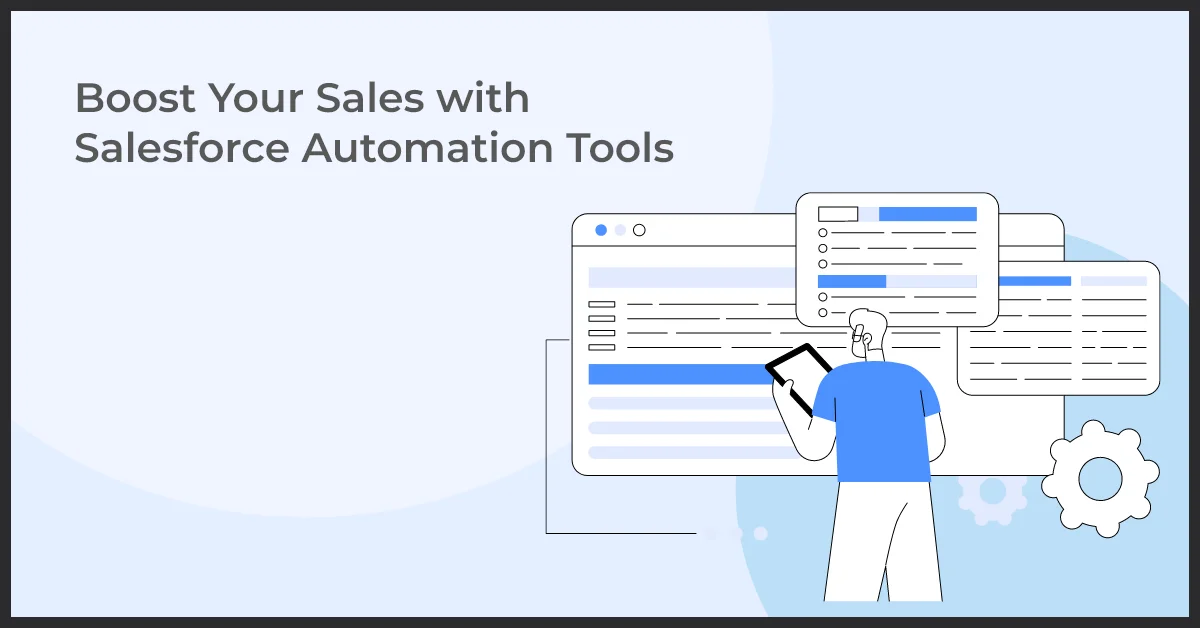Salesforce Automation Tools for Boosting Your Sales Performance

Published on: November 16, 2023
Updated on: March 03, 2025
2572 Views
- Salesforce
20 min read
Salesforce automation tools are essential for businesses aiming to streamline their sales processes and maximize efficiency. These tools help automate repetitive tasks, simplify data management, and provide valuable insights for sales teams.
By utilizing salesforce automation tools, businesses can save significant time and effort in their sales operations. They can automate tasks such as lead generation, contact management, opportunity tracking, and sales forecasting, allowing their sales teams to focus on building customer relationships and closing deals.
Furthermore, these tools give businesses a holistic view of their sales pipelines, customer interactions, and performance metrics. By capturing and consolidating data in real-time, they offer valuable insights for decision-making and strategic planning. This empowers businesses to identify bottlenecks, optimize sales processes, and drive revenue growth.
In today's competitive market, salesforce automation tools have become instrumental in increasing sales efficiency, driving workforce productivity, improving customer experiences, and ultimately, driving business success. It's time for your business to harness the power of these tools and revolutionize your sales operations.
Understanding Salesforce Automation
“The sales process is full of repetitive, administrative tasks, from data entry to task management. Sales force automation software automates many of these administrative duties so sellers can spend less time clicking around a CRM system and more time working with customers."–oracle.com
Definition of Salesforce Automation
Salesforce Automation (SFA) uses technology and software solutions to automate various sales tasks and processes. These include lead management, sales forecasting, opportunity tracking, and more. By automating these tasks, businesses can streamline their sales processes, enhance productivity, and improve overall sales performance.
Key components and features of Salesforce Automation
- CRM Software
- Lead management and tracking systems
- Sales process optimization
- Sales enablement tools
- Sales pipeline management
- Account management and sales forecasting
- Opportunity tracking and automation
- Sales performance analytics and reporting
Benefits of Salesforce Automation Tools
Implementing salesforce automation tools can bring numerous benefits to your business. Let's explore some of the key advantages:
Automate Routine Tasks
- Streamlining repetitive sales tasks: Salesforce automation tools can automate repetitive tasks such as sending follow-up emails or updating contact information, freeing up valuable time for your sales team to focus on building relationships and closing deals.
- Minimizing manual data entry: With automation, you can significantly reduce the need for manual data entry, eliminating errors and saving time.
- Improved data accuracy: Automation tools ensure data consistency and work accuracy by eliminating the risk of human error.
Enhancing Sales Productivity
- Efficient lead management and tracking: Salesforce automation enables efficient lead management by tracking and nurturing leads throughout the entire sales process.
- Improved sales process and workflow automation: Automation tools streamline the entire sales process, ensuring that every opportunity is handled properly and workflows optimized.
- Effective sales territory management: By automating sales territory assignments and providing clear visibility into territories, your sales team can effectively manage their territories and optimize their sales efforts.
Enabling Effective Marketing and Sales Collaboration
- Seamless contact and communication management: Salesforce automation tools enable seamless contact and communication management, ensuring that all relevant information is shared between marketing and sales teams.
- Integration with marketing automation tools: Salesforce automation integrates with marketing automation tools to allow for a unified approach to marketing and sales activities, ensuring better alignment and improved results.
- Aligning marketing efforts with sales strategies: With Salesforce automation, marketing teams can align their efforts with sales strategies, resulting in targeted and effective marketing campaigns that drive sales.
Enhancing Sales Performance Analysis
- Sales performance analytics: Salesforce automation tools provide comprehensive analytics and reporting capabilities that allow you to analyze and measure sales performance, identify trends, and make data-driven decisions.
- Real-time reporting and insights: With real-time reporting, sales teams can access up-to-date insights and metrics, enabling them to react quickly to changes and make informed decisions.
- Data-driven decision making: Salesforce automation tools enable data-driven decision-making by leveraging the power of data, helping you optimize your sales strategies and drive business growth.
Salesforce Automation Tools in Business
Choosing the Right Salesforce Automation Platform
When choosing a Salesforce Automation platform for your business, there are several key considerations to keep in mind. Firstly, you need to assess your specific business needs and goals. Are you looking for a platform that can handle large-scale operations or one that is more tailored to small businesses?
It is also vital to evaluate the available CRM software options to ensure that they align with your organization's requirements. Look for features such as lead management, contact tracking, and opportunity management to optimize your sales process.
Your existing systems also play a crucial role in the decision-making process. Look for Salesforce Automation tools that offer integration capabilities with your current systems to streamline operations and minimize disruptions.
Implementing Salesforce Automation Tools
Implementing Salesforce Automation tools requires a well-thought-out planning and implementation process. Defining clear goals and objectives and establishing a timeline for the implementation process is important. Having a structured plan in place can ensure a smooth transition and avoid any potential roadblocks.
Training and onboarding sales teams are also integral to the successful implementation of Salesforce Automation tools. Provide comprehensive training on using the platform effectively and offer ongoing support to ensure your sales teams have the necessary skills.
Ensuring user adoption and engagement is crucial for the long-term success of Salesforce Automation tools in your business. Highlight the new platform's benefits and advantages to encourage your sales teams to embrace it. By fostering a culture of adoption and engagement, you can maximize Salesforce Automation's potential in your organization.
Streamlining Lead Management with Automation
Efficient lead management is the cornerstone of any successful sales strategy. Businesses can significantly enhance their lead management processes by harnessing the power of Salesforce automation tools. Automation saves valuable time and increases the accuracy and consistency of your interactions with potential customers.
Tools for capturing and nurturing leads automatically
With Salesforce automation tools, capturing leads has never been easier. These tools enable seamless integration with your website, social media platforms, and other digital touchpoints, funneling all leads into a centralized system. Automation extends to lead nurturing, where personalized follow-ups are conducted based on customer interactions, ensuring none falls through the cracks.
Email campaigns and templates for targeted lead communication
Email communication remains one of the most effective ways to engage and convert leads. Sales teams can utilize automated email campaigns and templates to reach out to leads with targeted messages that resonate. Whether it's a welcome series for new subscribers or a nurture sequence for ongoing engagement, automation ensures your brand stays top-of-mind for potential clients.
Measuring lead conversion through reporting and analytics
Understanding the journey from prospect to customer is vital, and Salesforce automation tools offer robust reporting and analytics capabilities to measure lead conversion rates. Tracking the performance of different channels and strategies allows for data-driven decisions, helping refine marketing efforts and focusing on the most lucrative opportunities.
- Automated Lead Scoring: Segment leads based on their activities and engagement level.
- Real-Time Alerts: Get notified when a lead performs a significant action, allowing for timely follow-up.
- Customizable Dashboards: View your lead management metrics in a way that makes sense for your business.
By employing these automation strategies in lead management, businesses can ensure they attract high-quality leads and are equipped to convert them into valued customers efficiently.
Pro Tip: Regularly review and refine your lead scoring criteria to ensure that your automated lead management system accurately identifies and prioritizes high-quality leads for your sales team.
Mastering the Sales Pipeline Through Automation
Effective sales pipeline management is a cornerstone of successful sales strategies but can be complex and time-consuming when managed manually. Salesforce automation tools revolutionize this aspect of sales, offering unprecedented command over the sales process. Below, we delve into how Salesforce automates your sales pipeline, ensuring you not only stay on top of your deals but move them forward seamlessly and efficiently.
The Concept of Sales Pipeline Management in Salesforce
Sales pipeline management is the process of tracking and organizing every sales opportunity throughout different stages - from lead to customer. Each stage represents a step in the sales process, and by utilizing Salesforce automation tools, representatives gain a clear visualization of where each prospect stands, enabling them to tailor their approach effectively.
Workflow Automation for Guiding Sales Stages
Workflow automation is a powerful feature within Salesforce that helps in guiding prospects along the sales stages. By setting up automated workflows, tasks such as follow-ups, emails, and approval requests are triggered based on specific criteria, ensuring no opportunity falls through the cracks and that each lead receives timely attention.
Tracking Opportunities and Activities to Close Deals Faster
With Salesforce automation tools, tracking opportunities and related activities becomes a streamlined process. Sales teams have access to all the necessary information on a unified platform, allowing for swift response times and more informed decisions. Automation in tracking ensures you're always prepared to close deals faster and more effectively by utilizing up-to-date data and customer interactions.
- Automated alerts when opportunities reach certain stages
- Pre-defined activity templates for common tasks
- Real-time updates for team collaboration
- Integration with calendars for better scheduling
Embracing salesforce automation tools is pivotal in mastering the sales pipeline. It reduces human error, saves time, and ultimately accelerates the journey from lead to loyal customer. Harness the power of automation and transform your sales process into an efficient, scalable, and high-performing pipeline.
Enhancing Marketing Impact with Automation
Salesforce automation tools are transforming marketing efforts into data-driven powerhouse strategies that resonate with today's customers. By embracing these tools, organizations can leapfrog traditional marketing limitations, ensuring each campaign is as efficient and impactful as possible.
Marketing Automation Features within Salesforce
With Salesforce, the possibilities for automating your marketing processes are vast. From journey mapping to personalized content delivery, Marketing Cloud ensures that you're engaging with your audiences most effectively. Automating your marketing activities not only leads to greater consistency but also lets you scale your efforts without a parallel increase in resources.
Automating Email Campaigns for Personalized Outreach
Email remains a central pillar of marketing strategy. Salesforce's automation tools allow marketers to ensure that each communication is tailored and timely. By segmenting your audience and automating the email outreach, your marketing messages reach the right audience at the right time, boosting open rates and maximizing the chances of conversion.
Utilizing AI and Predictive Analytics for Smarter Marketing Decisions
- AI-powered insights: With tools such as Salesforce Einstein, your marketing is smarter than ever. Einstein's AI capabilities allow for predictive modeling and analysis, ensuring that your strategies are informed by data-driven predictions.
- Customer behavior: Understanding and anticipating customer behavior is key. Through predictive analytics, Salesforce helps you to personalize marketing efforts like never before, crafting campaigns that resonate with individual customer preferences and behaviors.
By leveraging these cutting-edge features within Salesforce, businesses can enhance their marketing impact, ensuring every campaign is not just a step but a leap forward in customer engagement.
Workflow and Processes Simplified
At the core of effective salesforce automation tools lies the profound ability to streamline workflows and simplify processes. When routine tasks and complex business processes are automated, organizations can refocus their efforts on growth and customer engagement rather than on mundane activities. Understanding how workflow automation enhances daily operations is crucial for businesses aiming to maintain a competitive edge.
Streamlining Daily Tasks and Processes
Workflow automation is not just about efficiency; it's about creating a framework that allows tasks to flow smoothly within an organization. By automating repetitive tasks, sales teams can reduce errors, speed up turnaround times, and ensure consistency across all customer interactions. This effortless progression of daily activities enables a more agile business response and frees up valuable time for staff to concentrate on strategic initiatives.
The Advantages of Organized Workflows for Sales and Marketing Teams
- Enhanced collaboration: With clear processes in place, teams can work together seamlessly.
- Better resource allocation: Organized workflows allow managers to effectively distribute workloads and manage resources.
- Improved accountability: Automated workflows make tracking progress and responsibilities straightforward.
Customization and App Development
No two businesses are the same, and salesforce automation tools shine in their ability to be customized. App development and customization options enable organizations to tailor their workflow automation to their specific needs. Whether it's adjusting existing workflows or creating entirely new apps to address unique processes, the flexibility offered by these tools ensures they fit the intricate puzzle of any business model perfectly. With salesforce automation tools, your business isn't just adopting software; it's enhancing its core operations to meet and exceed industry demands.
Email Campaigns and Templates at Your Fingertips
If there's one thing that can revolutionize the efficiency and consistency of your outreach, it's the automation of email campaigns within Salesforce. Embracing salesforce automation tools means unlocking a world where your email communications are not only timely but also impeccably crafted for every stage of the customer journey.
Automating Email Outreach for Efficiency and Consistency
The era of individually crafting each email is over. With Salesforce automation tools, you can set up sophisticated email sequences that respond to your customers' actions and behavior. This means delivering personalized email content that resonates with recipients, thereby increasing engagement and ultimately conversion rates. The result? A stream of communication that feels both personal and professional.
Building and Managing Professional Email Templates Within Salesforce
Creating the perfect email template can be a time-consuming task, but with Salesforce automation tools, it doesn't have to be. Users have access to a myriad of customizable templates, making it simple to maintain brand consistency across all messaging. Plus, these templates are not only visually appealing but also optimized for conversion, ensuring maximum impact for every email sent.
Tracking Campaign Performance with Detailed Analytics
With Salesforce's comprehensive analytics, every email campaign becomes a source of valuable insights. Track open rates, click-through rates, and overall engagement to understand how your audience interacts with your emails. This data empowers you to make informed decisions, tweak campaigns for better performance, and drive your business forward with actionable insights at your fingertips.
- Efficient, automated email outreach tailored for your audience
- Streamlined email template creation and management
- Deep insights with robust analytics and reporting capabilities
Pro Tip: Continuously monitor and analyze email campaign performance metrics provided by Salesforce's comprehensive analytics. Use these insights to refine your email content, optimize engagement, and tailor future campaigns for maximum impact, driving better results and enhancing your overall email marketing strategy.
Predicting the Future with AI and Predictive Analytics
Artificial Intelligence (AI) and predictive analytics are revolutionizing how businesses forecast their futures. Salesforce automation tools are at the forefront of integrating these advanced technologies to offer unprecedented insights and decision-making capabilities. By harnessing the power of AI, companies can not only improve their current operations and anticipate and prepare for future trends.
The Potential of Artificial Intelligence within Salesforce Automation Tools
AI transforms Salesforce automation by allowing systems to learn from data, identify patterns, and make decisions with minimal human intervention. This innovative approach provides a competitive edge through smarter and more efficient operations, ultimately driving better business outcomes.
Enhancing Sales Forecasting with Predictive Analytics
Predictive analytics tools delve deep into historical and real-time data to provide accurate sales forecasts. By analyzing past sales trends and customer behavior, businesses can predict future sales with more certainty, enabling them to allocate resources effectively and streamline their sales strategies.
Personalized Customer Experiences through AI-Driven Automation
Personalization is critical in the modern sales landscape. AI-driven Salesforce automation tools enable businesses to create highly personalized customer experiences by analyzing individual customer data and preferences, leading to increased customer satisfaction and loyalty.
- Salesforce automation tools powered by AI can automate routine tasks, freeing up sales reps to focus on building relationships and closing deals.
- Predictive analytics can identify the likelihood of a lead converting, allowing sales teams to prioritize their outreach efforts.
- A personalized experience not only bolsters customer satisfaction but can also increase a customer's lifetime value through tailored recommendations and services.
Mobilizing Your Sales Force with Salesforce Automation Tools
Mobile accessibility has become a cornerstone for the modern sales team. With sales environments being dynamic, representatives need to be agile, responsive, and equipped with the right tools to manage their sales performance wherever they are. Salesforce automation tools provide a vital link between the office and the field, ensuring that your sales force remains productive, informed, and ready to close deals at a moment's notice.
Sales Performance Management on the Go
Using Salesforce mobile apps, sales teams can easily monitor their performance, track their sales targets, and manage customer interactions directly from their mobile devices. This on-the-go management capability ensures that sales agents can adjust their strategies in real-time, responding to customer needs and market changes no matter where they are.
Real-Time Data Access and Updates
- Receive immediate notifications about new leads and opportunities
- Update deal statuses and log activities as they happen
- Access essential documents and sales collateral anytime, anywhere
With Salesforce automation tools, the entire sales force becomes more synchronized, driving efficiency and reducing the time between initial contact and deal closure. By leveraging the power of mobile technology, sales professionals can operate beyond the confines of the office, ensuring that critical data and updates are always at their fingertips.
Simplifying with Workflow Automation
Delving into the world of Salesforce automation tools, workflow automation stands out as a catalyst for operational excellence. By integrating automated workflows into sales and marketing strategies, businesses can achieve unparalleled efficiency and consistency in their operations. Let's explore the transformative impact of workflow automation and how to harness its power within Salesforce.
Streamlining Sales and Marketing with Automation
Imagine a workday relieved of repetitive tasks, where lead assignments, follow-ups, and customer interactions transpire seamlessly. Workflow automation provides such a reality. Here are some ways it enhances sales and marketing efforts:
- Automating lead scoring and distribution to ensure timely engagement
- Triggering personalized email campaigns based on customer actions
- Scheduling follow-up tasks for the sales team to maintain momentum
Building Custom Workflows in Salesforce
Constructing a customized workflow in Salesforce is a straightforward process designed to empower teams to build efficiency without needing extensive technical knowledge. Salesforce automation tools allow users to:
- Define rules that trigger specific actions based on data entries or changes
- Customize tasks and approval processes tailored to your business's unique needs
- Visualize and map out workflows to ensure clarity and comprehensiveness
With each automated workflow, the aim is to create a more fluid, responsive business model that can adapt to the market's ever-changing needs.
Gauging Automation's Impact on Operational Efficiency
The success of workflow automation can be measured through its palpable benefits in operational efficiency. Indicators of enhanced productivity include:
- Reduction in manual data entry and the errors associated with it
- Improved lead response times, catalyzing higher conversion rates
- Streamlined internal processes, freeing up time for strategic initiatives
Salesforce automation tools equipped with workflow automation allow businesses to use their resources more efficiently and improve the quality of their outputs, resulting in a noticeable boost in ROI.
Data Quality: The Foundation of Automation
At the heart of any effective Salesforce automation lies a cornerstone often underestimated—data quality. Without a robust framework ensuring accurate, consistent, and clean data, Salesforce automation tools can hardly deliver on their promise of efficiency and precision. Proper data management is not just a best practice; it is essential for businesses aiming to transform their operations.
The Role of Data Management in Salesforce Automation Tools
Data management serves as a critical function in any Salesforce automation strategy. The reliability of automated workflows, decision-making processes, and analytical insights depend heavily on the underlying data integrity. From triggering precise customer emails to forecasting sales trends, data quality directly influences the performance and output of automation tools, underscoring the necessity for meticulous data stewardship.
Best Practices for Maintaining High Data Quality
- Regular Data Audits: Periodically examine your datasets to identify inaccuracies, duplications, and outdated information that could skew automation results.
- Consistent Data Entry Standards: Implement rigorous data entry standards to ensure that all team members contribute to the database’s overall health.
- Continuous Data Monitoring: Utilize real-time monitoring tools to catch errors as they occur, averting the domino effect of bad data through your automated systems.
Tools for Data Cleanup and Maintenance within Salesforce
Thankfully, Salesforce automation includes tools designed for data cleanup and maintenance tasks. Tools such as duplicate management, data import wizards, and data validation rules empower users to maintain impeccable data hygiene. These tools not only detect and solve data issues but also help prevent future errors, thereby solidifying the role of quality data as the bedrock of Salesforce automation.
Elevating Customer Support with Service Automation
Salesforce automation tools are transforming how businesses interact with their customers. By leveraging these sophisticated tools, companies can drastically enrich the customer support experience. Service automation within Salesforce goes beyond basic functionalities—it provides comprehensive solutions that make every customer feel valued and understood.
Service Automation Features Within Salesforce for Exceptional Customer Support
Customer service departments are often the heart of a company's reputation. Salesforce offers a suite of service automation features designed to deliver efficiency and effectiveness. Using AI-powered chatbots for initial inquiries, intuitive ticketing systems that escalate more complex issues, and tools for omnichannel support, Salesforce enables support teams to deliver a consistent and personalized experience across all platforms.
AI-Driven Tools for Smart Case Routing and Management
With AI-driven tools like Salesforce Service Cloud, businesses can automate case routing to the right representative, reducing wait times and increasing customer satisfaction. Service Cloud employs machine learning algorithms to analyze incoming cases and direct them according to complexity, customer value, or the agent's expertise, ensuring that every issue is handled by the most qualified person.
Building a Knowledge Base for Automated Customer Self-Service
Empowering customers with self-service options is a win-win. Salesforce helps build an extensive knowledge base that customers can access to find answers quickly. This streamlined approach to self-service enhances the customer experience by providing instant solutions. It reduces the load on customer service teams, allowing them to focus on issues that require a human touch.
- Comprehensive FAQs and troubleshooting guides available round-the-clock boost customer empowerment and decrease resolution times.
- Automated response systems and chatbots that learn from each interaction ensure that customers receive the relevant support they need at any time of the day.
- Feedback loops continually improve the information repository, keeping it up-to-date with the latest solutions and product information.
Key Takeaways
- By automating repetitive tasks like lead generation and opportunity tracking, businesses can save time and focus on building customer relationships and closing deals.
- Reliable data is the foundation of successful automation. Regular audits and consistent data entry standards ensure accurate insights and efficient workflows.
- Salesforce offers sophisticated service automation features, including AI-driven chatbots and self-service knowledge bases, to deliver exceptional customer support experiences.
- Adopting Salesforce Automation Tools can drive sales productivity, improve customer satisfaction, and streamline operations, ultimately leading to significant business growth.
Conclusion
In conclusion, Salesforce Automation Tools play a crucial role in enhancing sales processes and driving positive business outcomes.
Salesforce Automation Tools are valuable assets for businesses of all sizes. Adopting these tools can increase sales, improve customer satisfaction, and streamline operations.
We encourage further exploration and adoption of Salesforce Automation Tools to maximize sales productivity and drive business success. By leveraging automation, businesses can remove manual bottlenecks, streamline their sales processes, and focus on building valuable customer relationships.
To learn more about Salesforce Automation Tools and how they can benefit your business needs, consider contacting industry experts or conducting further research. By embracing these tools, you can unlock new opportunities, improve your sales processes, and achieve significant business growth.
Get in touch with the Salesforce Automation Experts at Growthnatives, for more information and personalized attention. Email us at info@growthnatives.com to learn more.
Frequently Asked Questions
Salesforce automation refers to the use of technology and software solutions within the Salesforce platform to automate various tasks and processes related to sales, marketing, and customer service. This includes lead management, opportunity tracking, email marketing, workflow automation, and more.
Salesforce offers various automation tools tailored to different needs. The best tool depends on the specific requirements of your business. Some popular options include Workflow Rules, Process Builder, Flow Builder, and Einstein Automate (which includes tools like Salesforce Automation and Integration).
There are several types of automation in Salesforce, including:
- Workflow Rules: Automated actions triggered by specific criteria.
- Process Builder: More advanced automation with point-and-click configuration.
- Flow Builder: Visual automation tool for creating complex workflows.
- Apex Triggers: Code-based automation for highly customized processes.
- Einstein Automate: AI-powered automation tools for predictive analytics, chatbots, and more.
To automate a process in Salesforce, you can use one of the available automation tools like Workflow Rules, Process Builder, or Flow Builder. First, define the criteria or conditions that will trigger the automation. Then, configure the desired actions to be performed automatically when those conditions are met, such as updating records, sending emails, or creating tasks.
Salesforce offers multiple automation tools to cater to different automation needs. While the exact number may vary depending on how you categorize them, some of the primary automation tools in Salesforce include Workflow Rules, Process Builder, Flow Builder, Apex Triggers, and Einstein Automate, which encompasses various AI-powered automation features.



